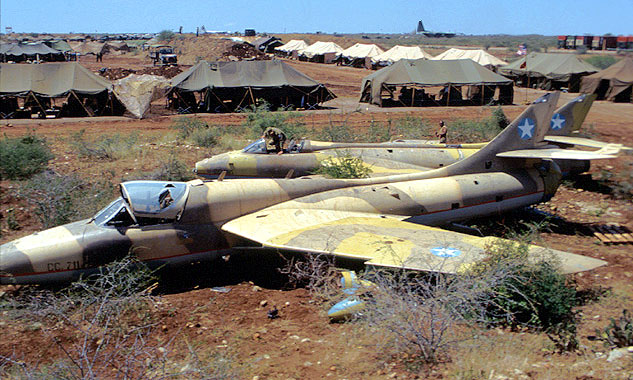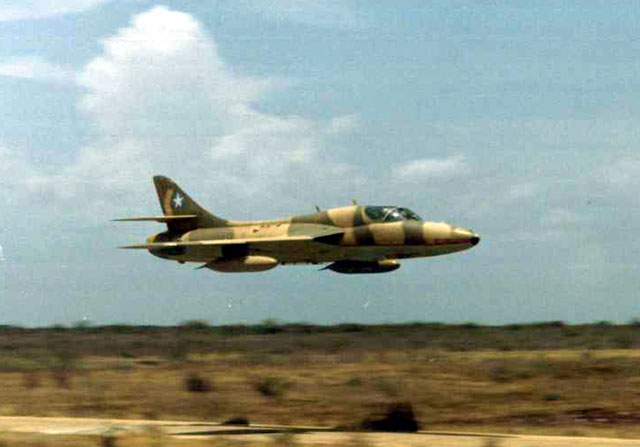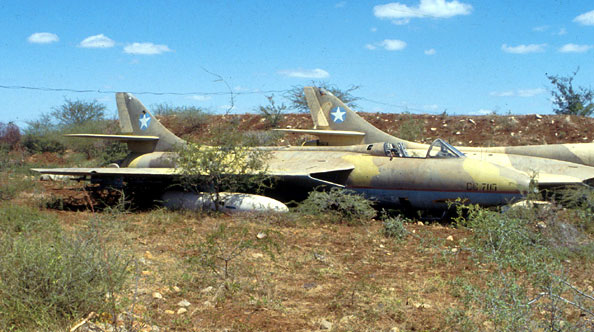|
Somali Hunters
by Mick Toal
|
 |
|
(foreground) Hawker
Hunter T.77 - Baidoa, Somalia, January 1993
Droptanks are still fitted
despite the collapsed undercarriage. Note the faded Middle Stone and
Dark Earth upper surfaces, the red pinstripe demarcation along the
fuselage centreline and light blue lower surfaces. There is evidence
that old markings have been overpainted with fresh brown paint on
the wings (under the national markings), the fin, rear fuselage and
under the windscreen. |
descriptions by Dave Carter

HyperScale is proudly supported by Squadron
Somali Hunters, Mid-1980s
Here are some photos of the Hunters in this article actually flying
back in the mid-1980s in the same location as the wrecks were photographed
the following decade. The planes were not being flown by Somali pilots.

These three images are supplied by courtesy of Mike Buck via Mick Toal.
Click the thumbnails below
to view larger images:
January, 1993
Here are some photos of wrecked Hunters
taken while I was in Baidoa, Somalia during January 1993. The following
text is Dave Carter's assessment of the photographs:
These Somali Hunters have been around!
The single seaters started life in the 1950s with the RAF. The two
seaters were with the Dutch Air Force. In 1969 they came together for a
mass refurbishment program and passed on to various smaller air forces as
cheap but effective combat aircraft. This was the UK's answer to the
American F-5!

The Somali planes were in a batch upgraded to F.76 and T.77 standard,
which incorporated a lot of the advances of the FGA.9. But while the FGA.9
was essentially a ground-attack aircraft, these late 60s updates for
export were more multi-role. Most seemed equipped to carry Sidewinder AAMs.
Anyway, the F.76s and T77s first went to Abu Dhabi. In 1975, the survivors
were passed to Jordan.
Jordan's Air Force had been badly mauled in the 1973 Yom Kippur war.
But it seems the Jordanians needed more modern equipment and passed all
their Hunters, including the Abu Dhabi examples, to the Sultan of Oman,
who already had Hunters in service.
This is where it gets murky. Oman gave Somalia several Hunters in 1983. It
is claimed these were the survivors of the original Abu Dhabi F.76s and
T.77s but who knows. After all these years and users, there would have
been little commonality among the F.76s.

All this goes a long way to explain how they ended on the dump.
Somali was getting faster and noisier MiG-21s about the same time, so I
expect these were preferred to the ageing subsonic Hunters. But
considering the way the Hunters were traded around the Middle East for 30
years, I bet they were a lot more reliable sucking in all that dust and
sand than the MiGs!
Images Copyright © 2002 by
Mick Toal
Description Copyright © 2002 by Dave Carter
Page Created 14 February, 2002
Last Updated
19 April, 2004
Back to
Reference Library
|
Home |
What's New |
Features |
Gallery |
Reviews |
Reference |
Forum |
Search